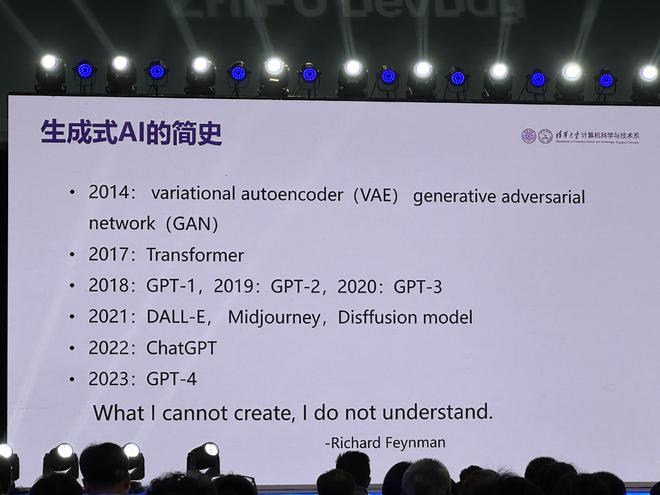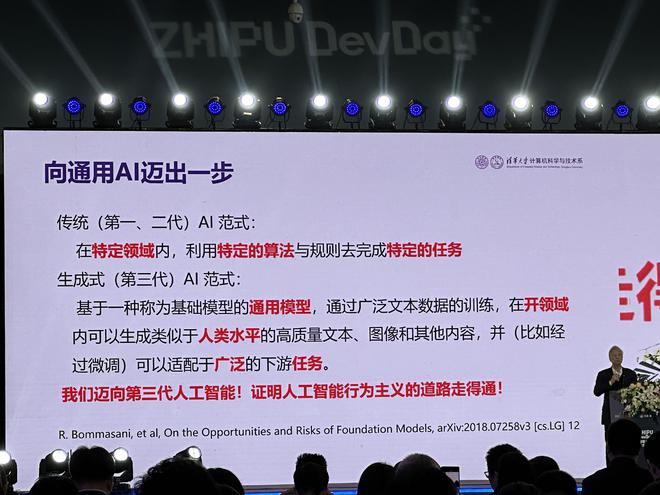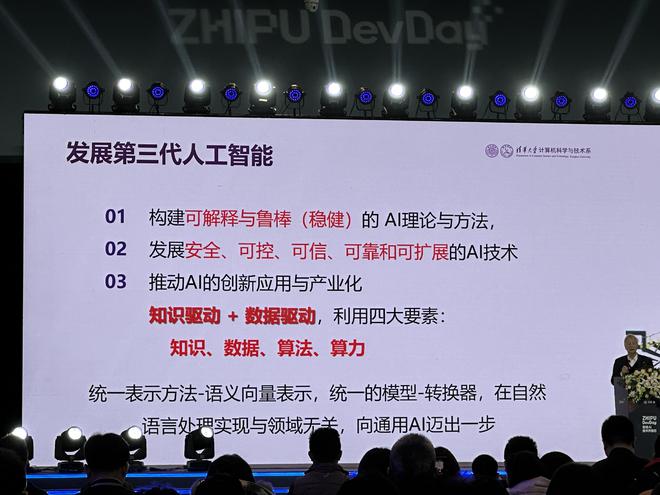
At the Zhipu AI Technology Open Day, Zhang Bo, academician of the Chinese Academy of Sciences and professor of Tsinghua University, gave a speech on the topic "From Large Language Model to General Artificial Intelligence". He shares insights into the current state and future of generative AI.

Academician Zhang Bo pointed out that we can only truly understand it by creating generative artificial intelligence. The development of generative artificial intelligence is very important to us.
In response to the current situation and problems faced by large models, Academician Zhang Bo proposed three major capabilities and one shortcoming of AI. The first is its powerful generation capability, which refers to the ability of AI to efficiently generate a large amount of high-quality content. Secondly, it has strong transfer (promotion) capabilities, which means that AI can transfer the knowledge and skills learned in one field to other fields to achieve cross-field applications. The third is powerful interaction capabilities, which refers to the ability of AI to interact naturally and intelligently with humans, such as speech recognition and natural language processing. However, one drawback of AI is illusion, that is, AI sometimes produces false information or results. This means that the AI may give inaccurate or unreliable answers in certain situations. Therefore, in the process of developing AI technology, the problem of illusion needs to be solved to ensure the reliability of AI. Academician Zhang Bo believes that the breakthrough point of generative artificial intelligence is the ability to answer almost any question based on context and past conversations. A natural language problem, realizing human-machine natural language dialogue and generating human-level text.
 Regarding the path to the development of general artificial intelligence, Academician Zhang Bo believes that the traditional (first and second generation) AI paradigm is to use specific ## in a specific field #Algorithm
Regarding the path to the development of general artificial intelligence, Academician Zhang Bo believes that the traditional (first and second generation) AI paradigm is to use specific ## in a specific field #Algorithm
Academician Zhang Bo finally said frankly that any country or nation must develop artificial intelligence to develop its economy. As for the new round of AI threats, he believes that everyone should not be nervous. Some jobs will be replaced, but most jobs will not. At most one-third, AI will join us as assistants in the future. 
The above is the detailed content of Academician Zhang Bo: Advantages and Disadvantages of Generative Artificial Intelligence. For more information, please follow other related articles on the PHP Chinese website!
 Application of artificial intelligence in life
Application of artificial intelligence in life
 What is the basic concept of artificial intelligence
What is the basic concept of artificial intelligence
 Is OnePlus or Honor better?
Is OnePlus or Honor better?
 How to turn off windows security center
How to turn off windows security center
 What to do if the documents folder pops up when the computer is turned on
What to do if the documents folder pops up when the computer is turned on
 Detailed explanation of dd command
Detailed explanation of dd command
 Usage of calendar class in java
Usage of calendar class in java
 Tutorial on adjusting line spacing in word documents
Tutorial on adjusting line spacing in word documents




